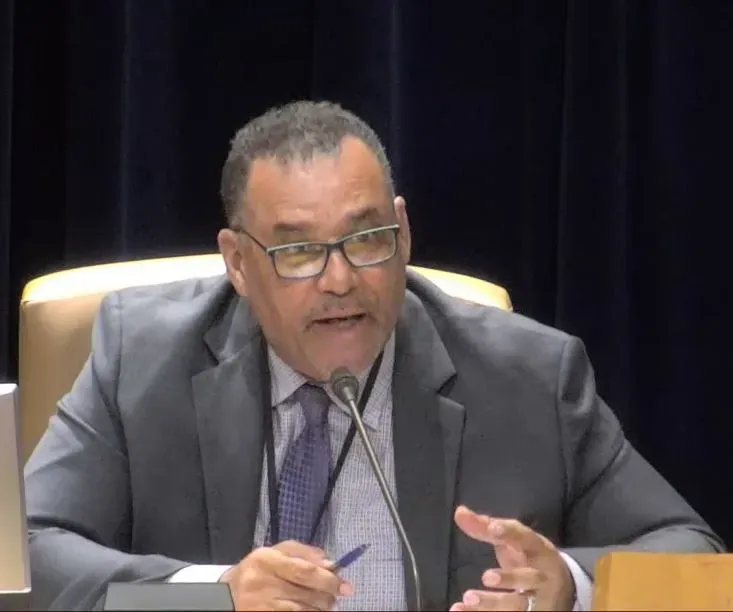
(Listen to the full Oliver Thomas interview here)
The table is set for the New Orleans 2025 mayoral race. And if you ask me, it's one of the most pivotal races in our city's history.
Now it's time to put each candidate's plan under the microscope. And one of those high-profile candidates is District E's City Councilmember, Oliver Thomas.
Today, Thomas joined the show to inform listeners about how he views the state of New Orleans after 7 years of the Cantrell Administration, and how he plans to enact change.
One of the main issues we talked about was government waste, and how to “right-size” New Orleans, similar to how DOGE is acting on a national level.
Thomas said, “I've said this publicly — no one's published it — when I speak about political culture in the city and right-sizing… The city had 503,000 people pre-Katrina, and the city budget was half a billion dollars. After Katrina, I think we went to the Landrieu administration., and the budget was around $800 million with 150,000 fewer people. Then during the Landrieu Administration, we had a high of 391,000 people with close to a billion-dollar budget. Now we have 360,000, 31,000 fewer people, with a $1.7 billion budget. It seems like the only budget that's grown is the government’s and our pockets have gotten lighter — the citizens.
“I've also done some independent surveys on my own,” Thomas continues. “Many who work within those departments believe that they can be better organized to produce more. What I have seen is the city budget grow. Delivery of services become less dependable. But the amount that we pay is more.”
What separates Thomas from the rest of the pack?
It’s always refreshing to hear someone talk about efficiency. But I asked Thomas why he hasn't taken every opportunity to hold the Cantrell administration accountable for the city government's mismanagement of city funds. What would be different about his style of leadership as opposed to the near-8-year trainwreck that we’ve come to know as the Cantrell administration?
In defense of his record, Thomas explains, “I've been back in politics for three years now so others have served there much longer than me. But when you ask me what things are different from when I served before to now, two things come to mind…Lack of institutional knowledge, which is something people complain about at every level of government now. And then the ability for folk to collaborate and work together.”
I pushed Thomas to get as granular as possible because, as I see it, our city can’t afford some pie-in-the-sky candidate. We need someone who understands our systemic failures and isn’t afraid to take severe action to mend them.
To this point, Thomas says, “If you want to talk about getting granular, there's no reason permits should take months and years to issue…(On roadwork) Once we dig, we should have 90 days to fix it…We shouldn't have four, five, six months before somebody comes back and fills the hole."
Thomas also expresses frustration over trash collection, “We should have 48-hour sanitation fixes. I think it should be 24, but let's say you need an extra day. If someone complains about mistakes in sanitation, why should it take a week for someone to come back and pick them up?"
Thomas contemplates Orleans Parish police chief elections
Perhaps the biggest revelation from our interview was Thomas’s desire to move out of the appointment process for police chief.
Thomas says, “I'd really like to sit down with the folk in the city to see… if it’s time now to consider electing our next police chief. Or at least having a committee of citizens involved in the review process, not just people from the government or people from the business community.”
I ask Thomas his opinion of Kirkpatrick’s performance since her 2023 appointment.
Thomas says, “I'm open to sitting with Chief Patrick, as well as all the citizens in this community, to give her and anyone else who would apply an opportunity. I think she's earned the right — a couple of snafu's, national and local — but she's earned the right to be considered.”
Returning the focus to essential services
Any routine listener of the show understands my opinion that this race is an opportunity to completely realign our priorities. This city, as far as I’m concerned, requires someone hyper-dedicated to basic infrastructure and delivery of city services first. Everything else is second.
Most residents know that’s not been the case. People want to say we can walk and chew gum at the same time, but we haven't. We’ve tripped all over ourselves, focusing on all sorts of backburner issues while ignoring the gaping issues like public transportation, trash collection, and roadwork.
In agreement, Thomas states, “If a light is out in a (crime) hotspot let's give it let's give a maximum of seven days to get those lights back on. A fully staffed emergency service should be a 10-second response for 911 calls. People shouldn't be holding, because that can mean life or death.”
“There are a lot of areas that I've been doing homework,” Thomas says in closing. “We need to not only become a 21st-century community when delivering services. But there are a lot of areas where we can do it better, as well as look at how much we're charging people. So if people are paying for two-a-day (trash) pickup but they're only getting one-a-day pickup what about an audit of trash services… to know we’re getting the best bang for our buck? All of that stuff is in my plan.”



